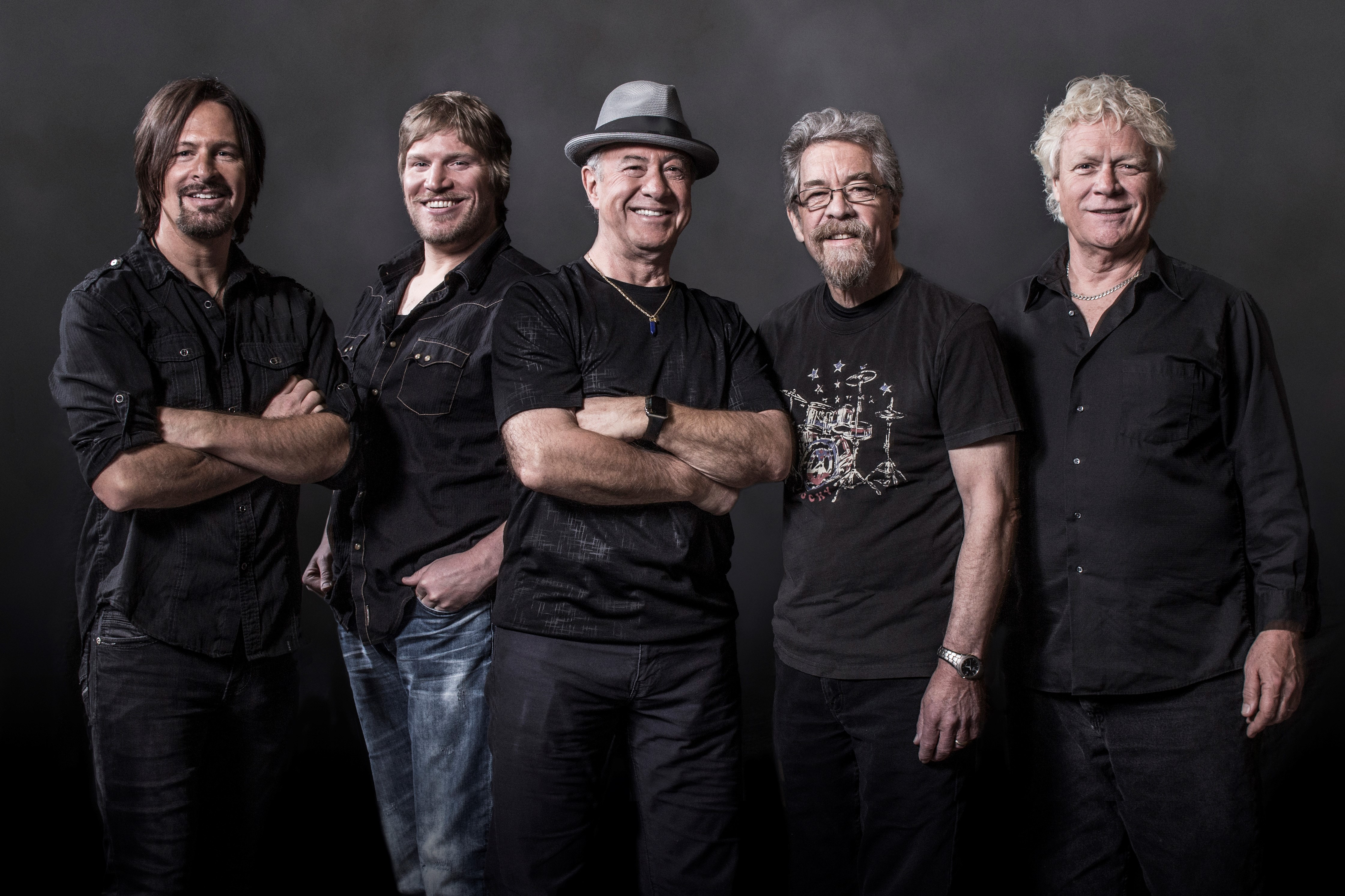Without Missing A Beat: A Conversation With CCR Drummer Doug Clifford
Creedence Clearwater Revival founding member and drummer Doug “Cosmo” Clifford knows that time is not on his side. Despite being a youthful-looking 72, acknowledges that the cycle of life is winding its way down for the iconic drummer who is forever ingrained in the rock and roll history book as being the timekeeper on such classic tracks as “Fortunate Son,” “Who’ll Stop the Rain” and “Bad Moon Rising.”
But recognizing one’s mortality doesn’t mean it’s the end of the road. Far from it. For Clifford, 72 is but a number. As time marches on, so does he — without missing a beat.
For the past 23 years, Clifford, along with former CCR bassist and long-time friend Stu Cook, have been thrilling audiences with their own renditions of those classic songs as part of Creedence Clearwater Revisited. And although a couple of the faces may be different in front of him, and he is no longer that San Francisco Bay-area teenager in a garage band with big talent and even bigger dreams, for Clifford, the feeling is the same as it was all those years ago. Maybe even better.
“It’s probably a bigger thrill now,” he said in a recent interview just before hitting the road once more. “When you’re a my age, you’re at the twilight of your career – and your life, quite frankly. There’s no guarantee for tomorrow and no one gets out alive, on this planet anyway, so it’s appreciated more as I go down the path.
“I wish I would have known back in the day what I know now, but it’s part of progressing. It’s a gift. I’m fortunate.”
You sound like you’re a “man of the road.”
I love the bus. I hate flying. It’s just gotten worse, and the older you get the less patience you have for stupidity.
How old are you, if you don’t mind me asking?
72.
Knowing that, and knowing that drumming is the most physically demanding instrument of them all, at your age, do you have to take a different approach in keeping your chops up?
Not really. It’s a responsibility. Practice for me is a part of the enjoyment of the instrument. It keeps the muscle memory going, and keeps me in the mode.
Do you watch your diet, exercise and those good things.
Yeah, you have to, really. Sometimes out here you have to bend the rules and take what’s available to you. My main objective is to get the amount of protein and calories to keep the fire burning.
What does having Stu there mean to you?
It’s terrific. I’ve known Stu 59 years. It’s great. We’ve always been a team and have an underdog chip on our shoulder. He’d be telling you the same thing. We’re having fun.
Harkening back to CCR. A lot of historic music was made. How did CCR come about?
We started when we were 13, then Tom Fogerty wanted to get a record deal and went to his band and told them. And like typical musicians, they asked if they were getting paid, and Tom said, “No, this is costing me money, but it’s going to be an investment in our future.” And then they said, “Are there going to be any chicks there?” (laughs) And he said, “No, were going in there to record two songs the best we can and then I’m going to go and procure a deal.” And they told him that they’d rather work on their cars. We were in an instrumental trio called the Blue Velvets, and we’d play around the Bay area, and Tom would come to our shows and gave us a lot of support, like an older brother. He came to us, told us what he wanted to do, and we said, “Yeah.” So it was Tom Fogerty’s dream, not John’s (Fogerty). And it started out pretty bad. (laughs) The tape does not lie. We sucked. But it started. And each time we went into the studio, we got better. We focused on our genre and not get caught up in fads. We learned to record together as a unit. People ask why the sound was so unique. That’s why. The people involved. And how we did it.
Then CCR starts rolling. You were a force to be reckoned with.
Exactly. I was the fulfillment of our dreams. We were seeing it. Hearing it on the radio, and actually making money. The reality of it was incredible. There we no drugs or alcohol. Ever. Even in the Bay area. Other bands during that time we calling us the “Boy Scouts of rock n roll” because we weren’t doing what they were doing and playing a style of music no one else was playing. They kept saying we will never make it. We made it bigger than anyone.
After the split in ’72, there was a lot of well-publicized acrimony, with lawsuits and mud slinging between the band and John. Most of it was business related. Was this side of John always there, or did it rear its head after the breakup?
It was readily apparent, once we had success. He had musical talent, and abundantly so, but he thought he could be a business manager, too. He didn’t have a clue and didn’t know how hard it would be and failed miserably. Stu has a business degree and said, “I’m not qualified. We need a real businessman in there.” There was a divide in there. John shut Tom off once we made it, but it was really Tom who brought us there. Stu and I stuck up for Tom, so we were in the doghouse with John, and he wouldn’t give it up. He really didn’t know what he was doing, but he wouldn’t let it go. He had to micro-manage everything. That hurt him more than anybody. He had the most to lose. It was tragic and just so unnecessary. We had it down on the side that we needed to – the musical side – and needed a guy like a Brian Epstein for the Beatles, who would take care of the business so we could rock and roll.
Was it the music that kept you guys together, then?
We were a team that he could count on. He knew we would show up, and do our homework. We would record our practices and jams, and that’s where a lot of the ideas came about song-wise for him. We didn’t get any credit for it, but that’s OK. I don’t mind. I know what we brought to the table. We all did. We were working together to make the best music we could. He was terrific at it and set a high bar. Sometimes working with him was a little difficult, but I would just that I had some stuff to work on, take my recorder home, and practice. We were dedicated to that process. He complained about us.
And probably shouldn’t have, if he were to look back and be honest.
He complained about us. Once he got rid of the people who were holding him back, he had two hits in 40 years, and we had 17 hits (as CCR) in less than four.
What are proud of the most of from those days?
We made the commitment and stayed the course. That’s part of the journey. The other part of it? That wasn’t so much fun. (laughs)
Do you ever see a time when you and Stu would join John onstage again?
I don’t. I would have been good 20 years ago. He’s just angry, and it’s everybody else’s fault but his. He takes no responsibility for that side of it. I’m too old and don’t need that in my life, that negativity. And what would be the point of it? It would be a money issue, basically. But that’s not where I’m coming from. We like to play, and we like the guys who we are working with.
You’re an artist. Is the yearning still there to create new music, maybe with the same guys, but not under the Revisited moniker?
People don’t want our artistic purposes. (laughs) They want the hits of Creedence Clearwater Revival, frankly. We’ve added album tracks, things like that, but they didn’t like it. (laughs) You’d see people heading to the exits to get a beer. (laughs) We play the hits. We love ‘em, and they love ‘em.
Do you consider Revisited the thing you’ll be doing until you put the sticks down for the last time?
I’ve had a few health issues to deal with, and if and when those things come up and I’m not able to play at the level I need to, well, it’s been a career, and we’ve gotten a lot out of it and a lot farther down the road than I thought.
Visit www.creedence-revisited.com for tour dates and more information.


